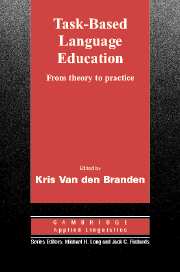Book contents
- Frontmatter
- Contents
- Acknowledgements
- Series Editors' Preface
- Chapter 1 Introduction: Task-based language teaching in a nutshell
- Chapter 2 From needs to tasks: Language learning needs in a task-based approach
- Chapter 3 Tasks for absolute beginners and beyond: Developing and sequencing tasks at basic proficiency levels
- Chapter 4 Developing language tasks for primary and secondary education
- Chapter 5 Task-based language teaching in science education and vocational training
- Chapter 6 Task-based language teaching and ICT: Developing and assessing interactive multimedia for task-based language teaching
- Chapter 7 Developing and introducing task-based language tests
- Chapter 8 The role of the teacher in task-based language teaching
- Chapter 9 A box full of feelings: Promoting infants' second language acquisition all day long
- Chapter 10 Training teachers: Task-based as well?
- References
- Subject Index
- Name Index
Chapter 4 - Developing language tasks for primary and secondary education
Published online by Cambridge University Press: 05 May 2010
- Frontmatter
- Contents
- Acknowledgements
- Series Editors' Preface
- Chapter 1 Introduction: Task-based language teaching in a nutshell
- Chapter 2 From needs to tasks: Language learning needs in a task-based approach
- Chapter 3 Tasks for absolute beginners and beyond: Developing and sequencing tasks at basic proficiency levels
- Chapter 4 Developing language tasks for primary and secondary education
- Chapter 5 Task-based language teaching in science education and vocational training
- Chapter 6 Task-based language teaching and ICT: Developing and assessing interactive multimedia for task-based language teaching
- Chapter 7 Developing and introducing task-based language tests
- Chapter 8 The role of the teacher in task-based language teaching
- Chapter 9 A box full of feelings: Promoting infants' second language acquisition all day long
- Chapter 10 Training teachers: Task-based as well?
- References
- Subject Index
- Name Index
Summary
This chapter focuses on the design of tasks, more specifically on the manipulation of task features believed to enhance language learning. We will demonstrate our case by referring to and drawing examples from task-based syllabuses that were developed for Dutch language education in primary and secondary education. The tasks in these syllabuses aim to support the students in acquiring the Dutch academic language proficiency needed to be successful at a Dutchmedium primary or secondary school. In describing the tasks, we will discuss the main task features enhancing language learning and also illustrate how classroom activities can be constructed around tasks. Reference will also be made to research studies that empirically substantiate the choices that we advocate.
Introduction
As pupils pursue their academic career, the linguistic demands of the school system that they are confronted with gradually increase. The language proficiency needed to understand the teachers' input in primary and secondary schools, aimed at transmitting subject content and enhancing the development of academic skills, knowledge and attitudes, strongly differs from the language pupils use in everyday situations outside school (e.g. Hodson, 1998; Mohan, 1986; Valdes, 2004) (for a more detailed discussion of the specific features of academic language at school, see also Chapter 5 in this volume). For instance, in classrooms, conversations are typically about abstract topics that are not present in the ‘here-and-now’. Language input is often not embedded in, or does not refer to, concrete situations.
- Type
- Chapter
- Information
- Task-Based Language EducationFrom Theory to Practice, pp. 76 - 105Publisher: Cambridge University PressPrint publication year: 2006
- 5
- Cited by



